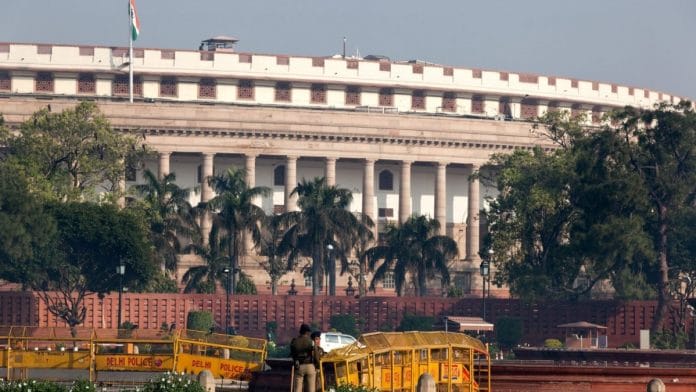In the wake of demonetisation, Rahul Gandhi promised an earthquake if allowed to speak in Parliament. But don’t hold your breath.
New Delhi: If people don’t remember why the Budget session of Parliament was a washout — like many others in the past — don’t blame it on the amnesia that politicians believe Indian voters suffer from. Even the Congress, the principal disrupter, may not remember it.
The opposition parties, especially the Congress, have been disrupting the proceedings of Parliament on issues that they tend to forget right after the session gets over. Or so it seems from the long list of issues they abandoned once live telecast of proceedings is over.
Remember the issues that resulted in logjams in the Budget and monsoon sessions of Parliament in 2015? One of them was the opposition parties’ demand for the resignation of union minister Nitin Gadkari following a CAG report that alleged irregularities in extending loans to Purti group.
“Chicken curry na mutton curry, istifa do Gadkari” was the slogan of Congress parliamentarians during the Budget session. The monsoon session that year was washed out too, as an unrelenting opposition demanded the resignations of external affairs minister Sushma Swaraj and Rajasthan chief minister Vasundhara Raje (for allegedly helping former IPL czar Lalit Modi), and Madhya Pradesh chief minister Shivraj Singh Chouhan (for the alleged Vyapam scam).
Once these sessions were over, the opposition parties got back to their normal business, and so did the union ministers and chief ministers in question.
The Budget session of Parliament in 2016 saw the opposition disrupting proceedings over the alleged multi-crore scam in the state-run Gujarat State Petroleum Corporation (GSPC). When was the last time you heard an opposition leader speak about the GSPC scam?
In the winter session that year, opposition parties stalled the proceedings for days, demanding an explanation from Prime Minister Narendra Modi on demonetisation, alleging that over a hundred people had died in queues outside banks in the ensuing scramble for cash. They continued to target the government over demonetisation in the first half of the Budget session 2017, but were much more accommodative subsequently, humbled by the results of the Uttar Pradesh assembly elections.
Some sessions have been marked by disruptions that seemed to be mutually convenient. So when the opposition raised questions about the Rafale deal, the treasury benches responded with barbs about Bofors or AgustaWestland. Congressmen have since moved beyond Rafale.
Parliamentary disruptions always trigger a blame-game between the government and the opposition parties. The opposition says it’s the government’s job to ensure the smooth functioning of Parliament, reminding the BJP of the argument it offered to defend its disruptive tactics while in opposition. Except for early 2016, when the then parliamentary affairs minister Venkaiah Naidu drove down to 10, Janpath to meet Sonia Gandhi to seek her party’s support for the GST bill, strategists of the ruling party haven’t shown much initiative to take the opposition along. It’s evident this time, too, as the government sent Vijay Goel, a junior minister, to meet former Prime Minister Manmohan Singh to seek his support for the smooth functioning of Parliament.
So when the monsoon session of Parliament commences Wednesday, brace yourself for yet another round of disruptions, with lot many new issues coming up.
Some die-hard optimists may still hope to see Congress president Rahul Gandhi cause an “earthquake” on the issue of demonetisation, a promise he made in December 2016, or force Prime Minister Narendra Modi to leave the Lok Sabha if he (Gandhi) is allowed to speak for 15 minutes, another claim he made this April. These optimists, however, may be in for disappointment again.
There are always new things to protest about.






